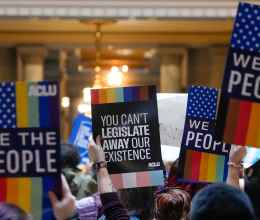
TALLAHASSEE, FL - Gov. DeSantis today signed Senate Bill 664, commonly referred to as the E-Verify bill, into law. The new law requires Florida employers to verify the eligibility to work for every current and prospective employee, including U.S. Citizens and lawful permanent residents.
Micah Kubic, executive director, ACLU of Florida responded to the bill signing saying:
“During these stressful times, the last thing we need is to make it more difficult for Floridians to work and further compromise the health of our economy. While this law does not mandate that private businesses use E-verify, it mandates the use of E-Verify for all public employers, including municipalities, local governments, or any public school, college or university, and it penalizes private employers who do not use E-Verify by prohibiting them from receiving economic development incentives. The result is that more employers will be utilizing -- and more workers will be subject to -- the error-prone E-Verify database that could result in hundreds of authorized workers being denied the ability to work without a meaningful avenue to seek redress. Mandating public employers and pressuring private employers to utilize E-Verify will be costly and burdensome to Floridian businesses and workers.
“Individuals are often not informed what specific records are the source of the E-Verify determination, and face obstacles in determining how to access their own information or seek corrections. In the weeks or months it takes to overcome these challenges, authorized workers can be fired or have employment offers withdrawn through no fault of their own.
“Inevitably, this requirement will open the doors to discriminatory practices by employers that would harm communities of color and immigrants. To avoid entanglement with immigration enforcement, employers may opt to simply not interview and refuse to hire applicants with foreign-sounding names because they want to avoid conflict with federal authorities or even any hassle of being challenged based on a mismatch.
“In Florida, where one out of every five people were not born in the U.S., it is critical that every person in our state is able to live, work and travel without fear of discrimination. The bottom line is that Floridians have bills to pay and families to provide for. The opportunity to work should not be contingent on this compromised system.”


